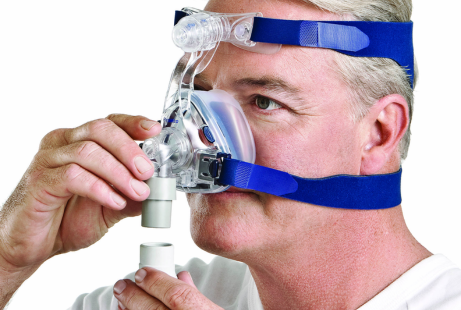Millions of Americans suffer from sleep apnea, a breathing disorder commonly treated with a continuous positive airway pressure (CPAP) machine. Many CPAP users think they must sleep on their backs to accommodate the mask, but this isn’t always necessary. At Lifekare Medical Equipment Trading LLC, we offer a variety of CPAP masks designed to let users lie comfortably on their side or stomach without discomfort.
Some CPAP users may need to use a specific mask, while others can choose one based on their sleeping position. It’s crucial to follow your doctor’s or sleep specialist’s recommendations when selecting a CPAP mask. Finding the right mask may involve some trial and error, but our knowledgeable team at Lifekare Medical Equipment Trading LLC can help guide you through the process and address any concerns. The ideal mask should be well-fitting and effective in managing your sleep apnea.
Explore our selection of CPAP masks and other medical equipment to find the best solution for your needs.
The Best CPAP Mask for Your Sleep Position
1. Masks for side sleepers using CPAP
- For side sleepers, conventional nasal masks are a good choice. One of the best sleeping positions for treating sleep apnea is on your side because it keeps gravity from affecting your airway the way it does when you’re on your back. Unfortunately, it can be challenging for side sleepers to find the ideal CPAP mask.
- In general, nasal pillow masks are a good choice for side sleepers. The mask can maintain its seal even if the sleeper turns their face toward the pillow because its low profile typically rests higher than the pillow itself.
- Another choice for side sleepers to consider is nasal masks. Side sleepers may still need a CPAP-friendly pillow to accommodate their mask, even with an effective seal and soft, adjustable headgear.
2. Masks for back sleepers using CPAP
- Full-face masks are simple for CPAP users who sleep on their backs. Back-sleeping CPAP users have a wide range of mask options because even full-face masks fit comfortably in this position. Even though sleeping on your back may be ideal if you use a CPAP mask, doing so increases the likelihood that your airway will collapse due to gravity.
- You will probably feel at ease wearing any efficient mask that meets your other needs if your doctor knows you sleep on your back and has not advised you to switch positions. Removing your mask in this position is also challenging, though some back sleepers may have trouble with single-strap headgear.
3. For stomach sleepers, CPAP masks
- Most people can only use nasal pillow masks to sleep on their stomachs.
- The least popular sleeping position is on one’s stomach, and those who do have special considerations when selecting a CPAP mask. Most masks press into the face because of the uncomfortable position, which frequently leaks air. Your head may be forced, resulting in pain or stiffness the following day.
- Due to these reasons, most people can only sleep on their stomachs when wearing a nasal pillow mask. Because of their low profile, nasal pillows are perfect for this because they are less likely to become dislodged or cause pain in any position. Even those who wear nasal pillow masks should check that their pillows accommodate the mask.
Healthcare Products Related to Selecting CPAP Masks:
- CPAP Machines: A range of CPAP machines is available to accompany the masks. These machines deliver a continuous stream of air at prescribed pressure levels to keep the airways open during sleep.
- CPAP Accessories: In addition to masks and machines, CPAP accessories such as tubing, filters, humidifiers, and cleaning supplies are essential for proper CPAP maintenance and optimal therapy outcomes.
- Sleep Apnea Diagnostic Tools: Diagnostic tools like home sleep study kits or oximeters help diagnose sleep apnea and determine the appropriate CPAP therapy.
- Patient Education Materials: Educational materials and resources for patients to learn about sleep apnea, CPAP therapy, mask selection, and proper usage are crucial for compliance and successful long-term treatment.
By offering a comprehensive range of CPAP masks and related products, along with expert guidance and support, Lifekare Medical Equipment Trading LLC, as a medical equipment supplier, helps patients effectively manage their sleep apnea and improve their quality of life.
Conclusion
In conclusion, selecting the right CPAP mask is essential for effective sleep apnea treatment and patient comfort. Considering your sleep position, consulting with your doctor or sleep specialist, and exploring different mask options can help you find the ideal fit. Contact us for expert guidance and assistance in choosing the best CPAP mask for your needs.
